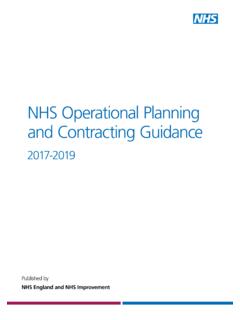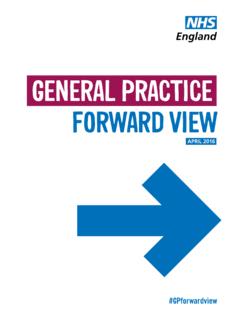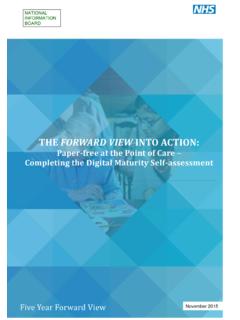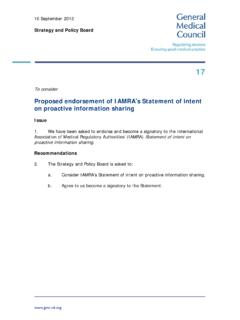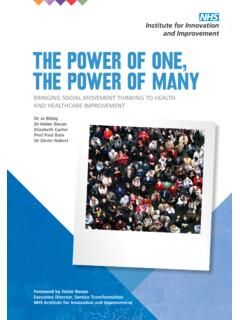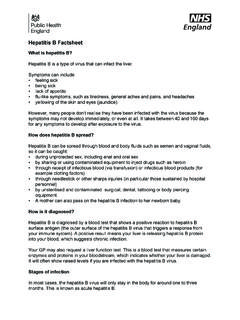Transcription of Implementing Lynch syndrome testing and surveillance …
1 Implementing Lynch syndrome testing and surveillance pathways A handbook to support local systems Classification: Official Publication approval reference: PAR622 1 | Implementing Lynch syndrome testing and surveillance pathways Contents The ambition .. 2 Lynch syndrome : what is it? .. 3 Case for change .. 4 Implementing Lynch syndrome pathways .. 5 Stage 1: Initial Tumour Test .. 7 Option 1: testing for Lynch syndrome using IHC .. 8 Option 2: testing for Lynch syndrome using MSI .. 10 Stage 2: Germline testing following either IHC or MSI testing .. 12 Stage 3: Management of index case .. 14 Stage 4: Cascade testing and surveillance of family members .. 16 Commissioning responsibilities .. 17 How to achieve success .. 18 Support resources .. 19 2 | Implementing Lynch syndrome testing and surveillance pathways The ambition The NHS Long Term Plan sets an ambition that by 2028, 75% of cancers will be diagnosed at an early stage. One of the ways this ambition will be reached is through targeted screening and personalised surveillance of those most at risk of developing cancer such as those with Lynch syndrome .
2 Each year, 1,100 colorectal cancers are caused by Lynch syndrome , making it the most common form of hereditary colorectal cancer. By Implementing Lynch syndrome pathways nationally for both colorectal and endometrial cancer we have the opportunity to detect many of these at an earlier stage and also prevent cancers through risk reduction treatments and appropriate surveillance routes. This handbook sets out guidance to support local systems to achieve this. It is intended to be helpful and set out best practice, but of course will need to be adapted to local circumstances. It has been shaped by the Lynch syndrome Expert Advisory For any questions about the handbook please email Professor Peter Johnson National Clinical Director for Cancer NHS England and NHS Improvement Dr Robert Logan National Clinical Advisor for Endoscopy NHS England and NHS Improvement 1 Acknowledgements: This handbook was developed by the NHS Cancer Programme. It has been shaped by the Lynch syndrome Expert Advisory Group whose members include, Prof essor John Burn, Dr Kevin Monahan, Dr Fiona Lalloo, Kevin Peters, Steven Hardy, Julia Jessop, Michelle Timoney, David Wells, Dr Suzy Lishman, Jessica Lewington, Dr Michael Machesney, Peter English, Momenul Haque, Emily Watts, Rebecca Cavilla, Bemenet Daniel and Robert Logan as National Endoscopy Advisor.
3 3 | Implementing Lynch syndrome testing and surveillance pathways Lynch syndrome : what is it? Lynch syndrome is an inherited genetic condition. It is caused by a germline pathogenic variant in one of four DNA mismatch repair (MMR) genes: MLH1, MSH2, MSH6 and PMS2. Pathogenic variants in another non MMR gene, known as EPCAM, can also cause Lynch syndrome . MMR genes encode proteins that are involved in recognising and repairing errors in DNA sequence, which occur when DNA is replicated during cell division. Pathogenic variants in MMR genes can lead to impaired functioning of the MMR system and a failure to repair DNA errors. Over time, this allows mutations to accumulate, potentially leading to cancer. Lynch -like syndrome is a condition where a genetic diagnosis of Lynch syndrome is suspected but cannot be confirmed using current genetic testing methods. Around half of all people with Lynch syndrome develop colorectal cancer. It is also responsible for a range of other cancers including endometrial, gastric, small bowel, urothelial and brain cancers.
4 There are around 1,000 cases at these other sites each year in the UK. A child who has a parent with a pathogenic variant has a 50% chance of inheriting that pathogenic variant. Since 2017, the National Institute for Health and Care Excellence (NICE) has recommended that all people with colorectal cancer are tested for Lynch syndrome using Immunohistochemistry (IHC) or Microsatellite Instability (MSI) testing (DG27). In October 2020, NICE also recommended testing for Lynch syndrome in people who are diagnosed with endometrial cancer using immunohistochemistry (IHC) (DG42). 4 | Implementing Lynch syndrome testing and surveillance pathways Case for change An estimated 175,000 people have Lynch syndrome in the UK but fewer than 5% of individuals know they have the condition (Bowel Cancer UK). In 2018, there were 35,958 new cases of colorectal cancer diagnosed in England. It is estimated that between 2,200 and 3,700 of these people would be eligible for full-screen germline genetic testing for Lynch syndrome .
5 Data provided to NCRAS by the NHS genomic laboratories suggests that 1,212 full-screen germline genetic tests for Lynch syndrome were performed in 2018. This handbook is to support compliance with DG27. If all people with colorectal cancer and their family members were tested for Lynch syndrome and enrolled into appropriate surveillance pathways in 2028, it could result in up to a point increase improvement in the proportion of cancers diagnoses early. People with Lynch syndrome have colorectal cancers that are more responsive to immunotherapy. NICE has recently recommended pembrolizumab for people with untreated metastatic colorectal cancer with high microsatellite instability or mismatch repair deficiency, including people with Lynch syndrome . It is therefore important that the initial tumour test (IHC or MSI) is done in time to inform their treatment options. Low cost treatments and services are available, subject to clinical assessment, to help people with Lynch syndrome manage and reduce their risk.
6 These include: Taking aspirin - NICE guidance (NG151) recommends people with Lynch syndrome consider taking aspirin daily for more than 2 years to prevent colorectal cancer. Losing weight - the risk of early onset colorectal cancer is more than doubled in Lynch syndrome patients who are also obese (Mathers et al) . 5 | Implementing Lynch syndrome testing and surveillance pathways Stopping smoking - people with Lynch syndrome may be at increased risk of colorectal cancer if they smoke regularly (Pande et al) Dietary advice - The CAPP2 study tested a daily supplement of resistant starch, also known as fermentable fibre in people with Lynch syndrome . This has shown a highly significant reduction over ten years in cancers in other part of the body such as the stomach, liver and pancreas. (Mathers et al in press). Surgery - Patients diagnosed with Lynch syndrome may choose to have adaptive surgery (bowel resection, hysterectomy or oophorectomy) to reduce their risk of developing cancer.
7 surveillance pathways to support early detection - there is guidance on recommended surveillance pathways for people with Lynch syndrome highlighted in this handbook. Implementing Lynch syndrome pathways In this handbook, the Lynch syndrome pathway has been split into four stages shown below: Stage 1: Initial tumour test 1. Biopsy taken and cancer diagnosed/confirmed 2. Test tumour using immunohistochemistry (IHC)2 or Microsatellite instability (MSI). Initial tumour testing should be completed in time to inform treatment options3 Stage 2: Germline testing 3. Test suggests cancer could be caused by Lynch syndrome 2 NICE DG42 guidance recommends that endometrial tumours should be tested f or Lynch syndrome using IHC. 3 The turnaround times outlined in this handbook for the initial tumour test and germline test are based on the timescales GLHs will be working to as they become firmly established. It is recognised that there will be a ramp up period whilst Cancer Alliances work with GLHs to streamline pathways and embed these standards.
8 6 | Implementing Lynch syndrome testing and surveillance pathways 4. If not already done, consent to perform germline testing 5. Perform germline testing . This test should take no longer than four weeks to complete. Stage 3: Management of index case 6. If Lynch syndrome is confirmed, communicate results to patients and refer to genetics service 7. Agree a screening and management plan and refer to relevant services Stage 4: Cascade testing and surveillance of family members 8. Cascade testing of at-risk family members 7 | Implementing Lynch syndrome testing and surveillance pathways Stage 1: Initial Tumour Test DG27 NICE guidance recommends all people with colorectal cancer are tested for Lynch syndrome using one of two initial tumour tests; IHC or MSI. Where no pathway currently exists, a pathway of IHC or MSI should be established. A genetic pathway (MSI) will naturally slot into the cancer gene panel sequencing being rolled out nationally. DG42 NICE guidance recommends all people with endometrial cancer are tested for Lynch syndrome using IHC.
9 Clinical Commissioning Groups should make sure there is appropriate IHC provision and funding to meet the needs of those with endometrial cancer. 8 | Implementing Lynch syndrome testing and surveillance pathways Option 1: testing for Lynch syndrome using IHC 9 | Implementing Lynch syndrome testing and surveillance pathways Notes A biopsy should be sent directly from endoscopy /gynaecology to pathology for diagnosis of cancer and IHC testing . Patients may present by alternative routes and consideration should still be made for Lynch syndrome testing BRAF V600E testing is not used in the endometrial pathway The initial tumour test should be a part of standard pathology and germline testing should be part of a mainstreaming approach Informed consent for germline testing is mandatory, but not for preceding steps in the diagnostic pathway. A decision can be taken locally on whether to take informed consent before the initial tumour test or before the germline test IHC testing should be completed within 7-10 days.
10 10 | Implementing Lynch syndrome testing and surveillance pathways Option 2: testing for Lynch syndrome using MSI DG42 NICE guidance recommends all people with endometrial cancer are tested for Lynch syndrome using IHC 11 | Implementing Lynch syndrome testing and surveillance pathways Notes A biopsy should be sent directly from endoscopy /gynaecology to pathology for diagnosis of cancer and preparation, then sent to the relevant GLH for MSI testing . Patients may present by alternative routes and consideration should still be made for Lynch syndrome testing BRAF V600E testing is not used in the endometrial pathway Informed consent for germline testing is mandatory, but not for preceding steps in the diagnostic pathway. A decision can be taken locally on whether to take informed consent before the initial tumour test or before the germline test. Steps across this pathway and the time taken to complete the test may differ depending on the MSI assay used by the GLH. MSI, BRAF and hypermethylation testing should be completed before the MDT, and results communicated to the patient within 4 weeks.
